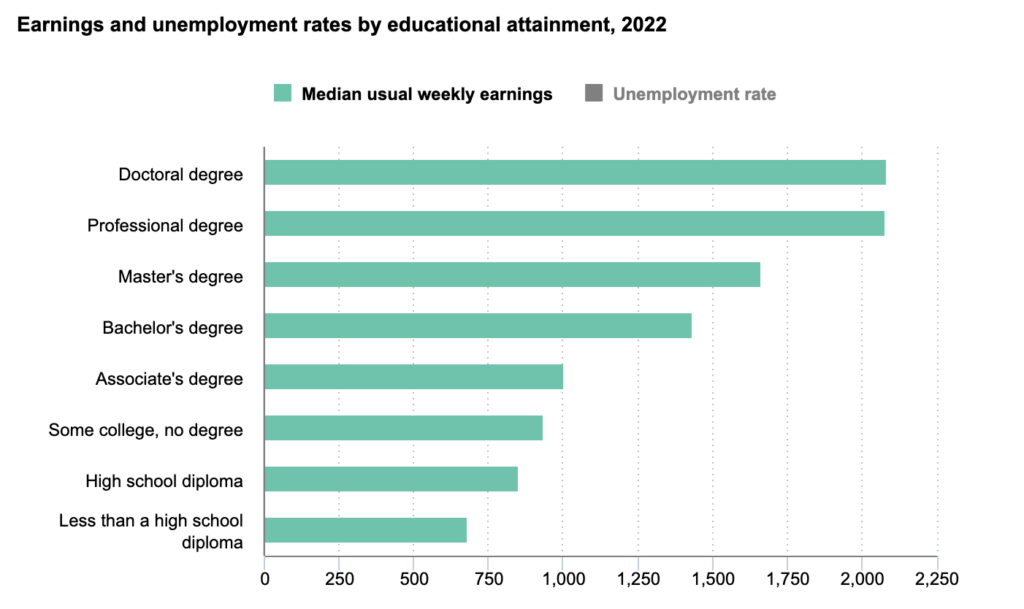
In today’s rapidly evolving job market, professionals are increasingly seeking ways to distinguish themselves and advance their careers. Postgraduate studies have emerged as a significant pathway for career development, offering a range of benefits beyond acquiring advanced knowledge and skills.
This article explores how pursuing further education at the postgraduate level can open doors to new opportunities, enhance career prospects, and provide a competitive edge in the job market.
Continue reading and find out more!
Broadening horizons through specialized knowledge
One of the primary benefits of postgraduate studies is the opportunity to gain specialized knowledge in a particular field. This technical focus enables individuals to become experts in their areas of interest, which can significantly enhance their employability and career prospects.
Employers often seek candidates with advanced expertise for higher-level positions, making postgraduate qualifications an asset for career advancement.
Networking Opportunities
Postgraduate programs also offer extensive networking opportunities. Students can connect with peers, faculty, and industry professionals with similar interests and goals. These connections can be invaluable for career advancement, providing access to industry insights, job opportunities, and professional collaborations.
Networking during postgraduate studies can establish a solid foundation for future career growth and development.
Developing critical skills
Beyond acquiring specialized knowledge, postgraduate studies foster the development of critical skills highly valued in the workforce. These include analytical thinking, research capabilities, problem-solving skills, and the ability to communicate complex ideas effectively. Such skills are applicable across various industries and can make candidates more versatile and attractive to employers.
Opening doors to leadership roles
For those aspiring to leadership positions, postgraduate qualifications can be particularly beneficial. Advanced degrees such as Master’s and Doctorates prepare individuals for leadership by teaching them how to manage projects, lead teams, and make strategic decisions. These programs often include practical components, such as case studies and internships, providing real-world leadership experience.
Enhancing earning potential
Investing in postgraduate education can also significantly impact an individual’s earning potential. Studies have shown that individuals with advanced degrees earn higher salaries than those with only undergraduate degrees. The combination of specialized knowledge, advanced skills, and the credentials of a postgraduate degree can position individuals for higher-paying roles within their fields.
According to BLS.gov, in 2022, for example, workers age 25 and over without a high school diploma had median weekly earnings of $682 in the U.S.. Workers whose highest level of education was a diploma made $853 per week, or just over 25 percent more than those who didn’t finish high school—and earnings improved with every level of education completed. (See chart.)

Lifelong learning and personal growth
Finally, postgraduate studies offer the opportunity for personal growth and lifelong learning. Pursuing further education can be a fulfilling experience, allowing individuals to explore their passions profoundly and satisfy their intellectual curiosity. Employers who value adaptability and a proactive approach to professional development view this commitment to continuous learning favourably.

How to maximize the benefits of your postgraduate studies
Making the most out of your postgraduate studies involves a combination of academic focus, personal development, and strategic networking. Here are some strategies to help you maximize the benefits of your postgraduate experience:
1. Engage deeply with your coursework
Dive into your subjects with the intent to master the material, not just to pass exams. Participate actively in classes, ask questions, and challenge yourself with topics that push your boundaries. This deep engagement will enrich your understanding and enhance your expertise.
2. Develop research skills
Postgraduate studies often require a significant amount of research. Take this opportunity to hone your research skills, including critical analysis, data collection and analysis, and academic writing. These skills are valuable for academic success and in many professional contexts.
3. Expand your professional network
Utilize the networking opportunities that come with your studies. Connect with professors, guest speakers, alums, and peers. These connections can offer valuable insights, mentorship, and potential job opportunities. Attend networking events, seminars, and conferences relevant to your field.
4. Pursue internships or part-time work
Gain practical experience related to your field of study through internships or part-time work. This can provide a real-world context for your academic learning, enhance your resume, and give you a competitive edge in the job market.
5. Get involved in extra-curricular activities
Participate in clubs, societies, and other campus activities. These can provide leadership opportunities, soft skills development, and the chance to engage with diverse people. Skills like teamwork, communication, and time management are invaluable in any career.
6. Seek feedback and mentorship
Regularly seek feedback on your academic work and professional development efforts. Establish relationships with faculty members or professionals in your field who can provide mentorship. Their guidance can be instrumental in navigating your career path and academic pursuits.
7. Work on a capstone project or thesis that aligns with your career goals
Choose a thesis or capstone project closely aligned with your career interests. This will make the work more engaging and serve as a showcase piece for potential employers.
8. Stay current with industry trends
Subscribe to journals, follow thought leaders on social media, and participate in industry forums. Staying informed about your field’s latest trends and challenges can enhance your studies and make you more marketable.
9. Practice self-care
Postgraduate studies can be intense, so it’s essential to maintain a healthy balance. Ensure you manage your time effectively, get enough rest, exercise regularly, and have downtime. Managing stress is crucial to maintaining high performance over the long term.
10. Plan your career path
Use your time in postgraduate studies to think strategically about your career path. Consider career services, workshops, and counseling offered by your institution to help refine your career goals and develop a plan to achieve them.
Making the most of your postgraduate studies is balancing academic rigor with personal growth and professional development. By taking a proactive and strategic approach, you can emerge from your postgraduate experience well-prepared for the next steps in your career.
Conclusion
Postgraduate studies represent a significant investment in one’s career and personal development. By providing specialized knowledge, networking opportunities, critical skills, and a pathway to leadership roles, advanced education opens doors to a wide range of career opportunities.
While the decision to pursue postgraduate studies should be carefully considered, the potential benefits for career advancement are clear. In a competitive job market, the additional qualifications and skills gained through postgraduate education can be the key to unlocking a rewarding and successful career.

